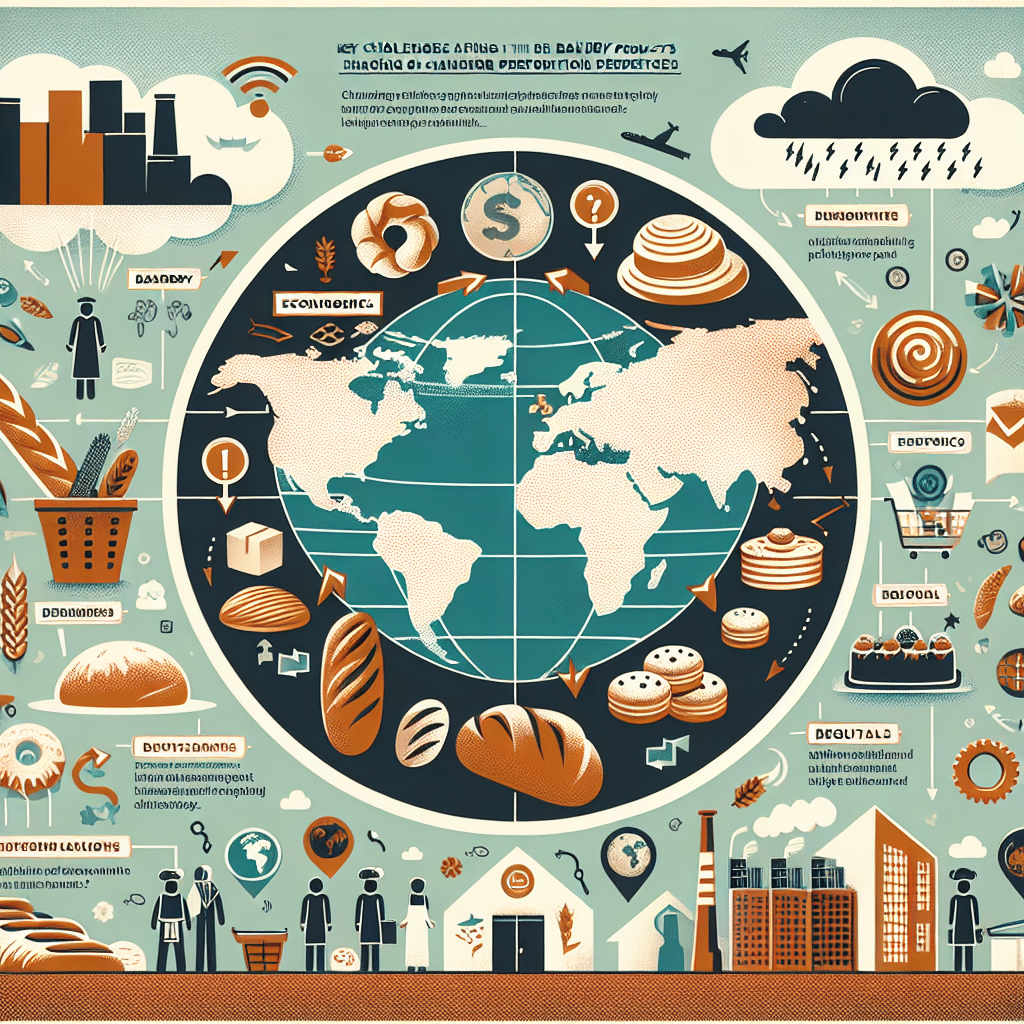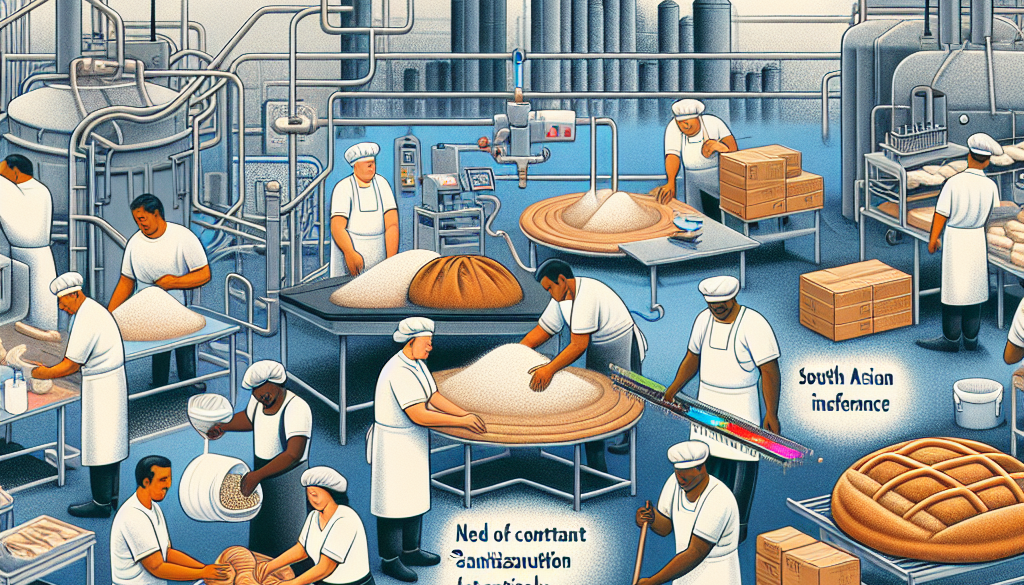Key Challenges Facing the Bakery Products Manufacturing Industry
-
Table of Contents
- Challenges in the Bakery Products Manufacturing Industry
- Compliance with Health and Safety Regulations
- Managing Ingredient Costs and Supply Chain Volatility
- Adapting to Consumer Preferences and Dietary Trends
- Competition and Market Saturation
- Technological Advancements and Automation
- Environmental Concerns and Sustainability
- Conclusion
- ETprotein: Enhancing Bakery Products with Quality Proteins
Challenges in the Bakery Products Manufacturing Industry

The bakery products manufacturing industry is a dynamic and ever-evolving sector that plays a significant role in the global food industry. However, as with any industry, it faces a myriad of challenges that can affect production, distribution, and profitability. In this article, we will explore the key challenges facing the bakery products manufacturing industry, supported by relevant statistics and insights.
Compliance with Health and Safety Regulations
One of the primary challenges for the bakery industry is adhering to stringent health and safety regulations. With increasing awareness of food safety, manufacturers must ensure their products meet the necessary standards to avoid recalls and legal issues.
- Implementation of Hazard Analysis Critical Control Point (HACCP) systems
- Compliance with the Food Safety Modernization Act (FSMA) in the United States
- Adhering to the European Union’s General Food Law Regulation
Managing Ingredient Costs and Supply Chain Volatility
Fluctuations in the cost and availability of raw materials can significantly impact the bakery industry. The prices of key ingredients like wheat, sugar, and dairy products are subject to change due to various factors such as weather conditions, political instability, and global market trends.
- Impact of climate change on crop yields
- Dependency on global supply chains for specialty ingredients
- Strategies to hedge against price volatility
Adapting to Consumer Preferences and Dietary Trends
Consumer preferences are constantly changing, and the bakery industry must adapt to meet these evolving demands. Trends such as gluten-free, organic, and low-carbohydrate diets have forced manufacturers to innovate and diversify their product offerings.
- Development of new products catering to health-conscious consumers
- Challenges in maintaining taste and texture with alternative ingredients
- Marketing strategies to appeal to niche markets
Competition and Market Saturation
The bakery industry is highly competitive, with numerous players ranging from artisanal bakeries to multinational corporations. Standing out in a crowded market requires strategic branding, product differentiation, and effective marketing.
- Strategies to gain a competitive edge in a saturated market
- Importance of brand loyalty and customer retention
- Impact of private label products on branded bakery items
Technological Advancements and Automation
Technological advancements present both opportunities and challenges for the bakery industry. Automation can lead to increased efficiency and reduced labor costs, but it also requires significant capital investment and can lead to workforce displacement.
- Investment in advanced baking equipment and robotics
- Integration of artificial intelligence for inventory management and demand forecasting
- Training and upskilling of employees to work alongside automated systems
Environmental Concerns and Sustainability
Environmental sustainability is becoming increasingly important for consumers and regulators alike. The bakery industry must address its environmental impact, including waste management, energy consumption, and carbon footprint.
- Implementing sustainable packaging solutions
- Reducing food waste through better inventory management
- Adopting renewable energy sources in production facilities
Conclusion
In conclusion, the bakery products manufacturing industry faces a complex set of challenges that require innovative solutions and strategic planning. From regulatory compliance and supply chain management to adapting to consumer trends and embracing technological advancements, manufacturers must navigate these obstacles to remain competitive and profitable. By addressing these issues head-on, the industry can continue to thrive and meet the demands of consumers around the world.
ETprotein: Enhancing Bakery Products with Quality Proteins
As the bakery industry seeks to innovate and cater to health-conscious consumers, incorporating high-quality protein into products is a growing trend. ETprotein offers a range of organic bulk vegan proteins that can enhance the nutritional profile of bakery items without compromising on taste or texture. Their non-GMO, allergen-free proteins, including rice, pea, and various seed proteins, are ideal for creating bakery products that appeal to consumers looking for healthier options. With a commitment to quality and customer satisfaction, ETprotein is a valuable partner for bakery manufacturers looking to overcome industry challenges and succeed in a competitive market.
About ETprotein:
ETprotein, a reputable protein and L-(+)-Ergothioneine (EGT) Chinese factory manufacturer and supplier, is renowned for producing, stocking, exporting, and delivering the highest quality organic bulk vegan proteins and L-(+)-Ergothioneine. They include Organic rice protein, clear rice protein, pea protein, clear pea protein, watermelon seed protein, pumpkin seed protein, sunflower seed protein, mung bean protein, peanut protein, and L-(+)-Ergothioneine EGT Pharmaceutical grade, L-(+)-Ergothioneine EGT food grade, L-(+)-Ergothioneine EGT cosmetic grade, L-(+)-Ergothioneine EGT reference grade and L-(+)-Ergothioneine EGT standard. Their offerings, characterized by a neutral taste, non-GMO, allergen-free attributes, with L-(+)-Ergothioneine purity over 98%, 99%, cater to a diverse range of industries. They serve nutraceutical, pharmaceutical, cosmeceutical, veterinary, as well as food and beverage finished product distributors, traders, and manufacturers across Europe, USA, Canada, Australia, Thailand, Japan, Korea, Brazil, and Chile, among others.
ETprotein specialization includes exporting and delivering tailor-made protein powder and finished nutritional supplements. Their extensive product range covers sectors like Food and Beverage, Sports Nutrition, Weight Management, Dietary Supplements, Health and Wellness Products, and Infant Formula, ensuring comprehensive solutions to meet all your protein needs.
As a trusted company by leading global food and beverage brands and Fortune 500 companies, ETprotein reinforces China’s reputation in the global arena. For more information or to sample their products, please contact them and email sales(at)ETprotein.com today.












